Sixties
City presents
a wide-ranging series of
articles on all aspects of the Sixties, penned by the creator of the iconic
60s music paper Mersey
Beat
|
Sixties
City presents
a wide-ranging series of
articles on all aspects of the Sixties, penned by the creator of the iconic
60s music paper Mersey
Beat
|
|||||
|
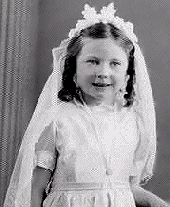
|
Liverpool’s
most famous female vocalist singer was born Priscilla Maria Veronica
White in Stanley Hospital on 27th May 1943 and grew up in a family with
three brothers.
She was
working as a dictaphone typist at the cable company BICC when she first
started singing with local groups. It all began when she went to the
Iron Door club with her friend Pauline Behan, who was going steady with
George Harrison at the time and was later to marry Gerry Marsden of
Gerry and The Pacemakers. The group on stage was Rory Storm and The
Hurricanes and Pauline asked them if Cilla could get up with them and
sing ‘Fever’. As a result she made several further appearances with
the band. Rory’s drummer was Ritchie Starkey, whom Rory had dubbed Ringo
Starr. Rory had also given him his own five-minute spot in the show
called ‘Starrtime’ and he generally sang one song per performance. ‘Boys’,
the song popularised by the Shirelles, was the number he usually performed,
but when Cilla began to sing with the band it was also the number that
she preferred. There was a bit of a dispute about this, which they resolved
by performing it as a duet.
Commenting on the compromise, Cilla said: “We did it as a duet, and even then he didn’t concede anything. He had a microphone over the drums and I used to have to sing it bent over his kit”. Ringo also took to calling her ‘Swinging Cyril’. While still working as a secretary, Cilla began to sing with the Big Three at the Zodiac Club (where she had previously served coffee) – and was paid for it! She also sang with Kingsize Taylor and The Dominoes, the group led by Ted Taylor, but had to leave the group when they left for Hamburg. The numbers in her small repertoire were ‘Fever’, ‘Always’, ‘Boys’ and ‘Summertime’. On 6th July 1961, in the first issue of Mersey Beat, I ran a feature called Swinging Cilla in which I wrote: “Cilla Black is a Liverpool girl who is starting on the road to fame.” The name was a mistake. I’d been rushing to complete the first issue and my mind had gone blank when writing about Cilla, although I remembered her surname related to a colour and decided to plump for ‘Cilla Black.’ When the issue hit the streets, Cilla White was pleased with the article and said that she liked the sound of the new name and would use it in future. In 1963, when Cilla was being launched, her press officer concocted a story that Brian Epstein had thought of the name change. He was probably unaware that the proof lay in the issue of Mersey Beat published almost two years before Brian was even aware of her existence. In her autobiography, Step Inside, Cilla wrote: “Not all the changes in my life met with the approval of me Dad. Although he was generally happy for me, he didn’t approve of the change of name from White to Black, which began as a misprint in Mersey Beat”. |
|
In an interview in the book ‘Secret Lives’, she said: “The 'Black' bit
came when a local paper, called the Mersey Beat, had a misprint. They
knew my surname was a colour and guessed wrong!”. As the Mersey scene
began to thrive locally, Cilla’s ambitions grew. She was still performing
as a semi-pro and a guy called Terry McGrath was pressing her to make
him her manager. She often dropped into the Mersey Beat office suggesting
that I become her manager, but I was too occupied with producing the newspaper.
During one of her visits I took her to a nearby coffee bar, the Coffee
Pot, where she described the career she had in mind. Peggy Lee was her
idol and she wanted to become a jazz singer. She asked me if I could fix
up for her to have a jazz trio backing her. This situation lasted for some time until one evening early in 1963, at the Blue Angel Club, I noticed Brian Epstein huddled in conversation with Andrew Loog Oldham. I took Cilla over to Epstein, introduced her and asked him if he would listen to her sing. Then he arranged for Cilla to join the group, The Masterminds, on stage and sing the number ‘Boys’. Afterwards, I brought her back to Epstein’s table and left her to it. She then told me that Epstein had arranged a meeting for her at his office the next day and she became the first female artist in his stable. Epstein realised that he could express his creative talents in the management of Cilla. He had no real grasp of the music of the Mersey Beat scene but had displayed an interest in the theatre and he set about developing Cilla’s image, even designing dresses for her to wear. Managing a female artist enabled Epstein to express part of his own personality. Her debut single ‘Love Of The Loved’, despite being a Paul McCartney composition, didn’t prove to be the right song for her and was only a minor hit, reaching No.35 in the British charts following its release on 27th September 1963. Initial 1963 publicity described her as ‘The Gal with the Bright Red Hair and the Jet Black Voice’ and she made her concert debut at the Odeon, Southport, in a show with The Beatles on 30th August. She then appeared with The Beatles on the all-Merseyside edition of the ‘Thank Your Lucky Stars’ TV show and was booked for the Beatles Christmas Show at the Finsbury Park Astoria in north London from 24th December. |
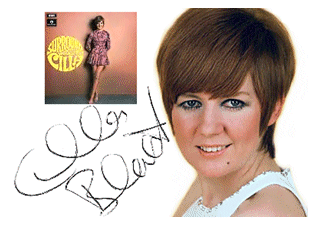
|
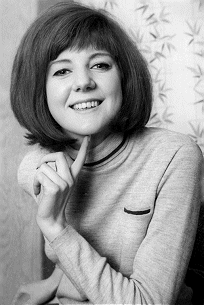 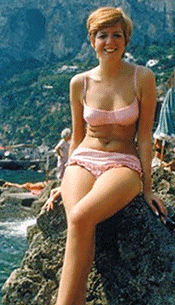 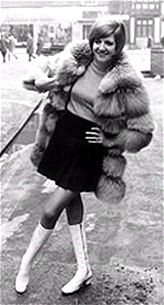 |
Not
unnaturally, Brian exploited the Beatles association in the building of
Cilla and his other artists – and also placed her with the Beatles’ recording
manager, George Martin. Her career changed direction with a number Epstein
picked for her, ‘Anyone Who Had A Heart’, which had been a big hit for
Dionne Warwick in America. He heard the number while on a trip to the
States and brought the record back with him, taking it to George Martin
as a song for Cilla to record. George said it would be perfect for another of his artists, Shirley Bassey, and told Epstein that Cilla couldn’t cope with such a song and wouldn’t have a chance with it. Sticking to his guns, Epstein insisted and Cilla’s version of the song topped the British charts. Brian was delighted at the opportunity of moulding a female artist and was able to continue placing her in concerts and TV shows with his other acts. She toured with Gerry and The Pacemakers and Billy J. Kramer, appeared on ‘Around The Beatles’ and ‘The Music of Lennon and McCartney’ TV specials and featured in the Gerry and The Pacemakers’ film ‘Ferry ‘Cross The Mersey’. Gradually, however, her image was directed away from Beat music towards the conventional world of traditional show business, with appearances at the London Palladium, the Royal Variety Show and in cabaret and pantomime. By 1965, using his prestige and contacts, Epstein attempted to break the 22-year-old Cilla into America. She made her TV debut on the ‘Ed Sullivan Show’ on 4th April and her American cabaret debut at the Persian Room in the Plaza Hotel, New York, from 26th July. However, American success was to elude her and her sole chart entry there was ‘You’re My World’, which reached No.26 in the Billboard charts in July 1964. Success on record in Britain continued throughout the decade. She followed ‘Anyone Who Had A Heart’ with her second consecutive No. 1 ‘You’re My World’, an adaptation of an Italian tune. A Lennon and McCartney composition, ‘It’s For You’, was her fourth release, reaching No.7 in the charts. John and Paul visited Cilla in the studio during the recording of the track and Paul played piano on it. Cilla covered the Righteous Brothers’ hit ‘You’ve Lost That Lovin’ Feeling’ and looked like beating them to the top of the charts. There was controversy at the time because many people believed that the Righteous Brothers’ single was so good it should have been given a clear run. In fact, Andrew Loog Oldham, manager of the Rolling Stones, took out an advertisement in the New Musical Express imploring record buyers to pick the original version rather than Cilla’s. Cilla had been No.2 in the chart and the Righteous Brothers No.3. The following week the Righteous Brothers leap-frogged over her to the No.1 position! |
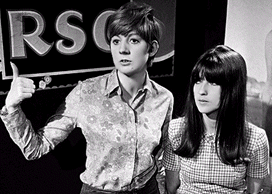 |
Her hits
in the Sixties were: ‘Love of the Loved’ (Parlophone R5065) which reached
No.35 in October 1963. She reached No.1 in February 1964 with ‘Anyone Who
Had A Heart’ (Parlophone R5101) and also topped the charts with ‘You’re
My World’ (Parlophone R5133) in May of the same year. ‘It’s For You’ (Parlophone
R5162) reached No.7 in August 1964. ‘You’ve Lost That Lovin’ Feeling' (Parlophone
R5225) reached No.2 in January 1965. ‘I’ve Been Wrong Before’ (Parlophone
R5265) reached No.17 in April 1965. ‘Love’s Just A Broken Heart’ (Parlophone R5395) reached No.5 in January 1966. ‘Alfie’ (Parlophone R5427) reached No.9 in March 1966. ‘Don’t Answer Me’ (Parlophone 5463) reached No.6 in June 1966. ‘What Good Am I’ (Parlophone R5608) reached No.24 in June 1967. ‘I Only Live To Love You’ (Parlophone R5652) reached No.8 in March 1968. ‘Where Is Tomorrow?’ (Parlophone R5706) reached No.40 in June 1968. ‘Surround Yourself With Sorrow’ (Parlophone R5759) reached No.7 in July 1969 and ‘If I Thought You’d Change Your Mind’ (Parlophone R5820) reached No.20 in December 1969. Cilla had a few further hits in the Seventies. By 1966 Cilla began to feel that Brian was neglecting her. For the first time he didn’t attend the opening night of one of her shows. She found she could no longer contact him by phone and had to talk to secretaries or assistants. When appointments were made he cancelled them or simply didn’t turn up. She discussed the situation with her boyfriend, Bobby Willis, and they decided to seek representation elsewhere. Bobby phoned NEMS and left a message for Epstein that Cilla would soon be looking for a new manager. Epstein had become dependent on drugs by this time, but the thought that Cilla might leave him proved so distressing that he arranged for Cilla and Bobby to meet him at his Chapel Street home for lunch. When they were together he broke down and cried, telling her: “There are only five people I love in the world. And that’s the Beatles and you, Cilla. Please don’t leave me, my Cilla, please”. |
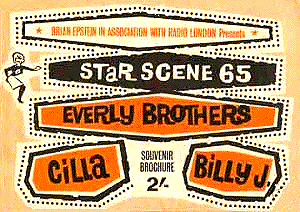 |
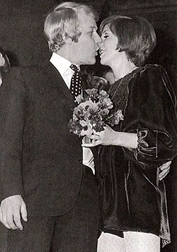 |
Touched
by the depth of his emotion, Cilla agreed – and the next day Brian arranged
for BBC TV to showcase her in her own series. This new direction was to
turn Cilla into one of Britain’s most popular mainstream entertainers, establishing
her career for the next few decades and reaping her awards such as Best
Female Entertainer of the Year for several years to come. Epstein died in
1967, before the series he set up for Cilla was televised. The first series of nine 50-minute shows, simply called ‘Cilla’, began in February 1968 and the series was to feature many top names, including Tom Jones, Donovan, Tony Bennett and Harry Secombe. Paul McCartney wrote a number called ‘Step Inside Love’ as the show’s signature tune, which became a Top 10 hit for her. This was the third song Paul had penned which Cilla had recorded and Paul made an acoustic version of the song as a demo for her. The initial show was seen on Tuesday 9th February and her special guest was Ringo Starr. The two of them appeared in a comedy sketch and sang a duet, ‘Do You like Me Just A Little Bit?’. Paul McCartney’s father Jim, who used to play it when he had a jazz band, had suggested the number. Ringo also performed ‘Act Naturally’ and appeared in a comedy sketch in which he was a ventriloquist and Cilla was his dummy. As he was the first Beatle to appear solo on another artist’s show, his fellow Beatles sent along a number of telegrams to the BBC studios where he was recording the show: “Come home, Jim. All is forgiven. Love. Your Buddies and Pals,” “We will be watching. Luv Herbert and Family” and “Big Brothers are watching and wishing you well. Love from your Big Brothers.” Cilla was to become a staple figure on British television, but she wasn’t successful in her film career. Apart from a cameo in ‘Ferry ‘Cross The Mersey’ she appeared co-starring with David Warner in the 1967 film ‘Work Is A Four Letter Word,’ and that’s about as far as her film career got.Incidentally, George Harrison originally wrote ‘The Light That Had Lighted The World’ for Cilla to record, but it ended up on his ‘Living In The Material World’ album. He also produced a session with Cilla in August 1972 when they both recorded two songs by George in the Apple Studios. They were ‘I Still Love You’, which George later gave to Ringo for the ‘Rotogravure’ album and ‘You Got to Stay With Me’. He had also written another song specifically for Cilla called ‘I’ll Still Love You’.Arrangements had been made for Cilla to record the song during a hectic summer season at Blackpool and she travelled to London on a Sunday to do so, with George producing and playing rhythm, Eric Clapton playing lead, Klaus Voormann on bass and Ringo playing drums. This session with Cilla was never completed because Cilla had been to the dentist prior to the session and the recording wasn’t successful, although George kept the tapes at Friar Park. George and Cilla bumped into each other in a vegetarian restaurant in 1982 and decided to finish the recording they began ten years earlier. Cilla’s version of the number was finally issued in 2003 when it was included on ‘Cilla: The Best of 1963-78’, a 3 CD set issued to celebrate the fortieth anniversary of her recording debut. |
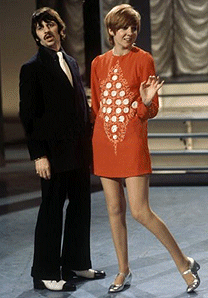 |
|
She also became a mum, giving birth to three boys, Ben, Robert and Jack,
between 1974 and 1980. By this time she was no longer achieving any success
on record and her career as a singer gave way to her new status as a television
personality. She and her family had settled down on a 17-acre estate in Buckinghamshire in a house formerly owned by Sir Malcolm Sargent. Under a lucrative contract with London Weekend Television, which made her Britain’s highest-paid female TV star, she started hosting the shows ‘Blind Date’ and ‘Surprise, Surprise’.Cilla was awarded an OBE in 1997 and in 1998 ‘Bobby’s Girl’, a biography by Douglas Thompson, was published. Sadly, Bobby was diagnosed with cancer and died on Saturday October 23rd 1999. Cilla’s first autobiography ‘Step Inside’ was published in 1985, her second, ‘Cilla Black: What’s It All About?’ in 2003, the year she celebrated her lengthy anniversary in show business. That was the same year she ended her 18 years as host of the TV show ‘Blind Date’ because of proposed changes to be made by the producers. She commented, “It was time to leave the show. I wasn’t quite happy with the changes. I’m of the old school – if it ain’t broke, don’t try to fix it”. The same year her triple CD was issued 'The Best Of Cilla Black 1963-1978’. In September of that year she also released her 15th studio album ‘Beginnings’. |
|
Article
Text
UK
web hosting by
|